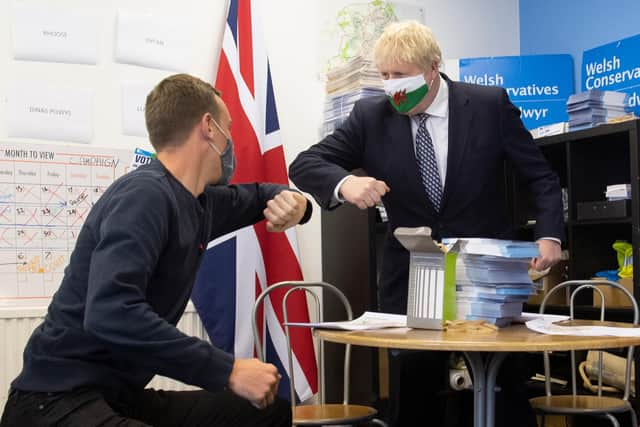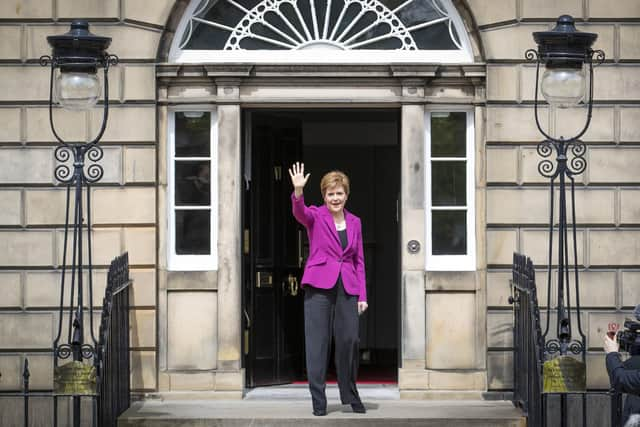Boris Johnson is pushing 'Middle Scotland' towards independence by pitting Britishness against Scottishness – Gordon Brown
But, as everyone agrees, the midst of a medical and economic crisis is not the time for a victory lap, nor for a headlong rush to irreversible constitutional change.
Our multiple social and economic crises – in health, social care, jobs, poverty and climate change – are so profound that the Scottish people want time to heal and time to look at what independence and the alternatives to it really offer.
Advertisement
Hide AdAdvertisement
Hide AdThis sentiment emerges from the in-depth polling carried out by Our Scottish Future on and after election day last Thursday. We wanted to find out what lay behind the country’s choices of MSPs and the early results tell us far more about what people are thinking than any political party’s post-election claims will ever reveal.
On the face of it, Scotland now looks divided into two camps: the half who want independence and the half who want the Union. But that is a two-dimensional view of the electoral geography that inevitably cannot cover all that is happening on the ground. For that we need a three-dimensional view, for there are in fact three Scotlands, not two.
Patriots, not nationalists
Of course there are the ideologically committed nationalists – just above 30 per cent of the electorate – and the out-and-out unionists, who also number about 30 per cent. But there are 40 per cent in the middle, without whose vote no majority can be built for independence or the Union.


Not surprisingly, Middle Scotland shares some of the characteristics of wholly committed nationalists: not only do they feel more Scottish than British but they prefer the Scottish Parliament over a UK Parliament and the Scottish First Minister to the UK Prime Minister.
If asked to choose between the two, they would choose Scotland rather than Britain and when they vote SNP, it is because they take the view that it is best at standing up for Scotland.
But, crucially, they don’t want to make the choice between being Scottish and British. Unlike the nationalists they have not given up on a British dimension, however small, in their lives.
In short, Middle Scotland are patriots who love our country but they are not – or at least not yet – nationalists. They do not see life as an endless “us versus them” struggle between Scotland and the UK.


‘Muscular unionism’
Indeed on the same day that 48 per cent voted for the SNP, 73 per cent of Scots – and almost all middle Scotland – told our pollsters that they wanted better cooperation between Scotland and the rest of the UK. And the living symbol of this British connection, illustrated by the success of co-operation in the vaccination programme, is for Scots, the NHS, despite the fact that it is administered separately here, in Wales and Northern Ireland.
Advertisement
Hide AdAdvertisement
Hide AdNicola Sturgeon and Boris Johnson do not share much but they have this in common: neither truly represents the views of middle Scotland. Indeed by trying to force Scots to choose between Scotland and Britain, the pair are colluding with the other to turn the complex 3D reality of Scotland into a binary 2D contest.
Of course, it is not in Nicola Sturgeon’s interests to champion a more pluralist identity; her life’s work is to break up the UK and her mission is to force Scots to choose Scotland over Britain. Her weakness with Middle Scotland is not that she wants to do things differently – devolution is about adjusting policies to local needs – but that all too often she refuses to cooperate even when it is in Scotland’s interests to do so.
Yet rather than call this nationalism out, Boris Johnson’s response, which ends up asserting Britishness in competition with Scottishness, only helps to stand it up.
His "muscular unionism” comprises putting up more flags, labelling UK-financed bridges and roads as gifts from the UK, and generally by-passing the Scottish government as if it did not exist.
Even though he championed it for London itself, he apparently doesn’t believe in devolution for the part of the UK that is furthest away from the centre. But it won’t work. When he said devolution was a disaster, he may have thought he was attacking the SNP. Instead he ends up at odds with mainstream Scottish opinion.
Alternatives to nationalism and the status quo
Today Our Scottish Future will transform itself from think tank into campaigning movement and invite people to join us in putting the positive, progressive and patriotic case for Scotland in Britain.
We will argue for a reformed UK with a more inclusive centre, a permanent decision-making forum that brings the leaders of the nations and regions together, and for UK resources to back local policies for economic prosperity. Only when the economic initiatives that are the key to the future of our outlying areas are taken more seriously in Whitehall will I believe Britain is starting to get it right.
And if the Prime Minister really is to be “minister for the Union” rather than just “minister for unionists”, he needs to do more than call ad-hoc meetings with the leaders of Wales and Scotland.
Advertisement
Hide AdAdvertisement
Hide AdHe should now institute a constitutional review, as Keir Starmer has already done, into the whole future of the United Kingdom, specifically asking it to investigate alternatives to nationalism and the status quo.
And he should immediately call together leaders from the regions and nations, not as a one-off, but in a task-force to tackle our multiple crises. As he must now realise, he has to change if the United Kingdom is to stay together.
Gordon Brown is a former Labour Prime Minister and founder of the non-profit organisation Our Scottish Future
A message from the Editor:
Thank you for reading this article. We're more reliant on your support than ever as the shift in consumer habits brought about by coronavirus impacts our advertisers.
If you haven't already, please consider supporting our trusted, fact-checked journalism by taking out a digital subscription.
Comments
Want to join the conversation? Please or to comment on this article.
